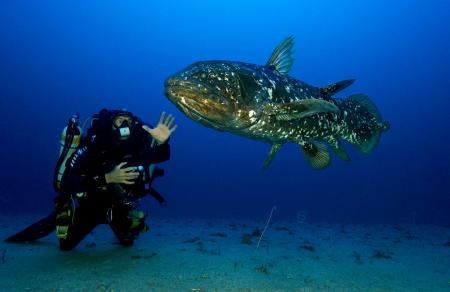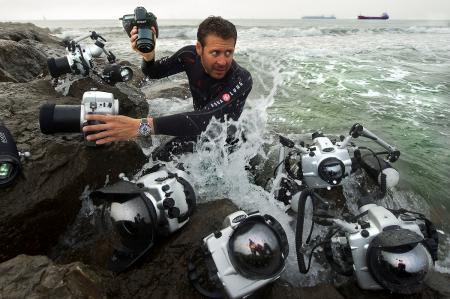Blancpain supports The GOMBESSA Project
Last April 5th, globally renowned diver and naturalist Laurent Ballesta, equipped with a Blancpain Fifty Fathoms timepiece on his wrist and accompanied by specially trained divers and researchers from the South African Institute for Aquatic Biodiversity SAIAB, together with ten scientists from the Museum of National History and from CNRS, the French National Research Institute, all left for South Africa to undergo 40 days of deep water diving to meet with legendary bottom-dwelling sea creature, the cœlacanth.
Locally known as Gombessa, this peaceful giant measures two metres long and was once thought to have become extinct 70 million years ago. However, this rare fish, when discovered alive in 1938 has come to represent one of the most important zoological discoveries of the 20th century:
– it is seen as the ‘transition animal’ from backboned fish to the earliest four-legged vertebrate land animals; and
– with its lobe fins and ‘primitive lung’, this fish bears testament to our forays within the primordial soup, 379 million years ago.
For over a century, the cœlacanth has sparked intense debate between scientists and creationists. Portrayed as the crucial link between fish and land animals, it is without doubt one of the most hotly dissected and debated creatures of our time, and yet we know almost nothing about its way of life. Extremely rare and living over 100 metres deep, very few direct sightings have been witnessed until now. The GOMBESSA expedition, the result of two years’ scientific research, logistical and human preparedness, for the first time enabled observations and scientific experiments to be carried out in contact with a living cœlacanth.
To reach this living legend, Laurent Ballesta and his team of divers had to perform daily deep water dives to Jesser Canyon caves, 120 metres below the surface: a depth where each minute passed underwater is paid for in long hours of decompression.
Once in contact with the animal, they implemented scientific protocol devised by the research team from the National History Museum and from CNRS, led by Professor Gaël Clément, palaeontologist at the Museum, and by South African biologists, Kerry Sink and Angus Paterson from SAIAB.
Blancpain & the underwater world
Driven by a spirit of innovation since its founding in 1735, Blancpain boasts a longstanding link with diving since 1953, when the Manufacture developed the first modern diving watch: the Fifty Fathoms. This mechanical model, so-called because it offered water tightness to 50 fathoms (around 91 metres) defined, for the first time, the specifics of a true diver timepiece. Today, the Fifty Fathoms collection remains the reference in the world of diving watches and combines watchmaking know-how with strict diving safety standards.
Blancpain’s commitment to the ocean is today displayed in a desire to make this vast and mysterious universe better known. Convinced that we can only respect and protect what we love, and can only love what we know, the Swiss watchmaking brand supports several major scientific expeditions including the “Pristine Seas Expeditions with Blancpain” for National Geographic, (an exploration, research and conservation project) and “Gombessa” for Laurent Ballesta, 2013 winner of the “Hans Hass Fifty Fathoms Award”.
For a few years now, the Manufacture has also collaborated with Gianluca Genoni, the multiple record breaking Italian freediver and diving school based in Monaco, Etoile Bleue. Each year Blancpain releases Edition Fifty Fathoms, a publication dedicated to the underwater world, and which is distinguished by the quality of its photographs. In 2012, Blancpain was key partner of the first World Oceans Summit organised by the Economist.
Laurent Ballesta
Born in 1974 in the south of France, Laurent Ballesta is a marine biologist and scientific diver. He combines his passion for underwater photography with an aptitude for deep water diving. His work attracted the attention of the selection committee for the Historical Diving Society Hans Hass during his deliberations for his 2013 prize. Laurent Ballesta is globally renowned and admired by his peers due to his scrupulous attention to detail during his deep dives, his scientific expeditions and extraordinary photographs.

